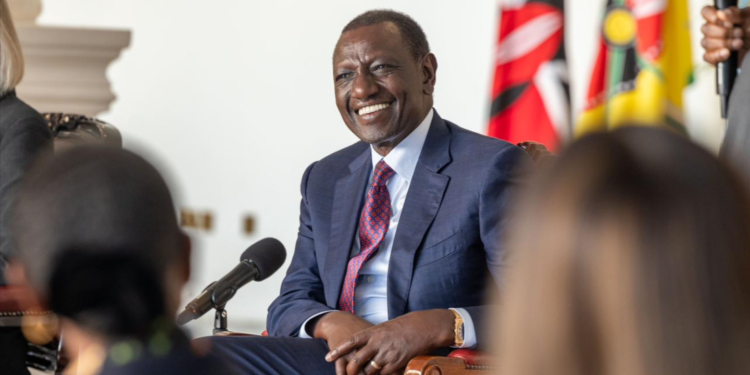President William Ruto has unveiled his ambitious plan to significantly increase the country’s tax revenue during his tenure.
Speaking during an engagement with the Harvard Business School’s Class of 2025 students on Africa’s trade and investment potential at State House, Nairobi on Tuesday, the President outlined his determination to push Kenya’s tax-to-GDP ratio to between 20% and 22%, up from the current level of 14%.
“My drive is to push Kenya, possibly this year, to 16% from 14%. I want, in my term, God willing, to leave it at between 20% and 22%,” Ruto declared, acknowledging the challenges that lie ahead but emphasizing the necessity of such a move.
To clarify, presently, out of every KES 100 the country earns, approximately KES 14 is allocated to the government in taxes. The President intends to increase this to between KES 20 and KES 22 per KES 100.
The President’s remarks came as he urged Kenyans to embrace fiscal discipline and live within the country’s means. “I am not going to preside over a bankrupt country. I am not going to preside over a country that is in debt distress,” he asserted, setting the tone for his administration’s approach to managing public finances.
Ruto’s push for higher tax revenues is rooted in the belief that Kenya’s current tax burden is significantly lower than that of its regional peers. According to the President, empirical data from last year showed that Kenya’s tax revenue as a percentage of GDP stood at a mere 14%, well below the average of 22% to 25% observed among other African nations.
“Our peers on the continent are on average between 22% and 25%, which means we are way below; our taxes are way below those of our peers,” Ruto noted.
The President’s ambitious target marks a significant departure from the status quo and is expected to face resistance from various stakeholders. However, Ruto expressed his determination to make a compelling case for the proposed tax hikes, acknowledging the need for extensive public engagement and persuasion.
“It’s going to be difficult. I have a lot of explaining to do. People will complain, but I know finally they will appreciate that the money we go to borrow from the World Bank is the savings of other countries. We have to begin to live within our means,” he remarked, emphasizing the importance of fiscal prudence and self-reliance.
Ruto’s tax reform agenda is part of a broader strategy to reduce government spending and enhance revenue collection, with the ultimate goal of fostering long-term fiscal sustainability and reducing Kenya’s reliance on external borrowing.
















